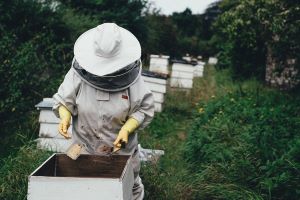Q. How does one start, and increase an apiary in and around Carterton?
A. It depends on whether you want to be a hobbyist or commercial beekeeper.
In the first case the best step would be to join a local beekeeping club, your nearest is likely to be Wellington Beekeepers’ Club, you are fortunate in that they are a good club with a strong tradition of mentoring and supporting their members.
The next step would be to buy and read the NZ beekeeper’s “bible”, Practical Beekeeping in New Zealand. The next two essential books would be Control of Varroa & Elimination of American Foulbrood. You will soon learn that most of beekeeping is keeping your bees alive. There are other very good books available but remember that a lot are written for overseas beekeepers. While these are useful, you should consider the different laws in NZ compared to other countries; also climatic differences play a big part. There are lots of videos on YouTube and once again be very wary of overseas content. A particularly good series Is Trevor Gillibanks from Trev’s Bees.
Get a mentor; someone whom you can ask for advice whenever you need, beekeepers tend to be generous with advice and sharing their experience. It is to everyone’s benefit for all beekeepers to be well versed in best practices.
Get a bee friend; someone to share your journey and equipment
Become an intern or get a job in a commercial operation; learn on someone else’s bees.
Buy a beekeeping business with a certain amount of handover time; basically buying a mentor.
Do a course. There are several providers, I’m a Tutor with Land Based Training. This is a level 3 qualification. Split equally between the classroom and apiary and runs throughout the season from August to May; usually all day every other Saturday. This gives you a mentor and bee friends; and experience of what to expect and where to look for answers.
The other part of your question, how to increase your apiary. There are several ways to increase the number of hives, bear in mind that quite often hives will be lost over winter – 10% is not unusual, so you need to increase to keep numbers stable. You can buy hives, sometimes these may come with an apiary site, or you could run around collecting “free bees” during swarm season. Other ways include buying nucs, packages or making splits from existing hives. The most effective way for a commercial or semi-commercial is to learn the art of queen rearing. With this you will be able to re-queen annually to reduce swarming, and create splits from your surplus bees after harvest. A good way to learn is to take a level 4 Queen Rearing course. I would also recommend David R. Woodward’s book Queen Bee: Biology, Rearing and Breeding.
The mānuka boom is over and beekeeping is a very hard business. Starting a beekeeping business without experience will be a very steep learning curve. There are no shortcuts.
Ken Brown is an Apiculture Land Based Training tutor, Vice President of the Auckland Beekeepers Club and a keen hobbyist beekeeper.

